6+ Business Analyst Examples to Download
Many professionals or even young individuals venture into business. In hard times, people will always find a way to generate income. That is why business analysts come in place to help the business improve including its products and services. If you aspire to become a business analyst, it is better to check on the list if you are qualified to be one. In this article, you will be able to know what specific role and responsible a business analyst does.
6+ Business Analyst Examples
1. Business Analyst Job Description Template
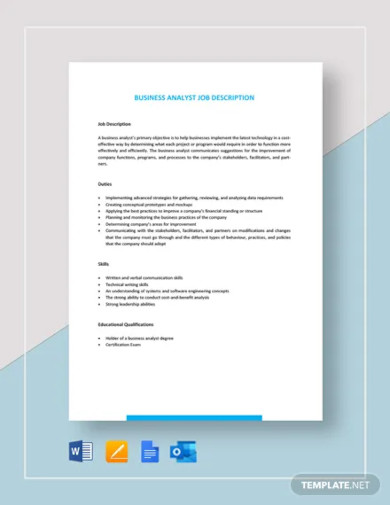
2. Business Analyst Manager Cover Letter Template
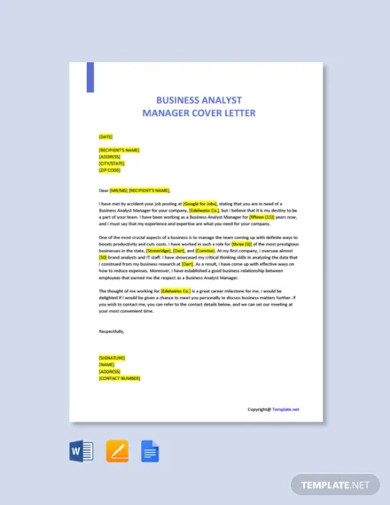
3. Business Analyst Trainee Resume Template

4. Business Analyst Template
5. Basic Business Analyst
6. Case Study Business Analyst
7. Technical Business Analyst
What is a Business Analyst?
A business analysts are responsible for guiding business for the improvement of their products and services. They use data analytics to assess and determine requirements and recommendations to the respective stakeholders and business executives.
They usually collaborate with other business owners and leaders to understand the overall process, services, products and more for value and efficiency. Depending on the responsibility of a business analyst, he or she will have the chance to work with improving the overall condition of the business.
Job Description of a Business Analyst
- Business analysts create methods that support the decision in every business by working intensively with the financial aspect and establish strategies to improve the optimization of the costs.
- They are responsible in creating a detailed business analysis and identifying problems and its corresponding solution.
- Budgeting
- Forecasting
- Planning and monitoring
- Business reporting
- In charge of business requirements
To become an outstanding business analyst, you have to be good in solving problems and analyzing data. You also need to have a good communication skills within your clients and other workmates.
Skills of a Business Analyst
– analytical skills
– attention to every single detail
– communication skills
– organization
– problem solving skills
– teamwork
– time management
– facilitation skills
– consultative skills
– knowledge and business structure
– cost benefit analysis
Common Employers of Business Analysts
- Specialist Business Analysts Firm
- Consulting and Professional Service Firms
- Public Sector Organizations
- Technology Companies
- Research Firms
- Large Organizations that require In-house Analysts – this includes bank and other large companies
In some companies, the role of a business analyst is considered technical. It usually involves implementation of new systems with the benefits of the new technology. They have the option to work ‘in-house’ for a company. They can either work on their employer’s project or be an employee of a certain firm.
FAQs
Do I need experience in that field to apply for a job as a business analyst?
Some companies won’t need an experience in applying as business analyst. However, most companies would require one or two years of experience depending on the qualification they set when they are opening a job for this kind of position. What’s important is you already have the required skills to get the job done.
I am applying for the job of a business analyst, do I need to have an impressive resume?
A resume should contain information that will impress the company you have applied for. You have to put information that would convince the employer or human resource manager that you have all the reasons to be qualified for the job.
Is a business analyst’s role to manage projects from a company?
It may be part of their responsibility, but other than that their roles are broad which includes the budgeting, making decisions for business venture, etc.
The responsibility of a business analyst is never easy just like any other job positions. It requires a lot of effort and dedication to finish a task and be able to do it almost perfectly. As long as you have the skills and proper training that would let you feel you are qualified for the job, then grab the opportunity while it is still there. Look for an employer that you think would best suit you and would help you grow into a much better business analyst in the future.
6+ Business Analyst Examples to Download

Many professionals or even young individuals venture into business. In hard times, people will always find a way to generate income. That is why business analysts come in place to help the business improve including its products and services. If you aspire to become a business analyst, it is better to check on the list if you are qualified to be one. In this article, you will be able to know what specific role and responsible a business analyst does.
6+ Business Analyst Examples
1. Business Analyst Job Description Template

Details
File Format
MS Word
Google Docs
Pages
2. Business Analyst Manager Cover Letter Template

Details
File Format
MS Word
Google Docs
Pages
3. Business Analyst Trainee Resume Template

Details
File Format
MS Word
Pages
4. Business Analyst Template
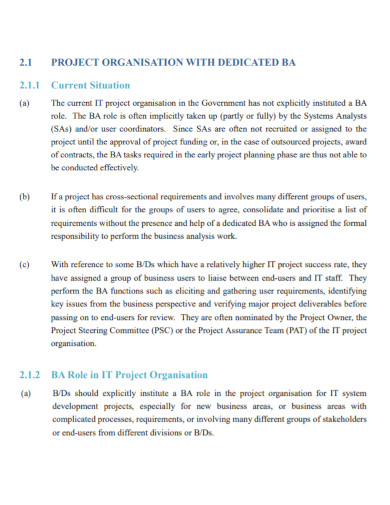
ogcio.gov.hk
Details
File Format
PDF
Size: 639 KB
5. Basic Business Analyst
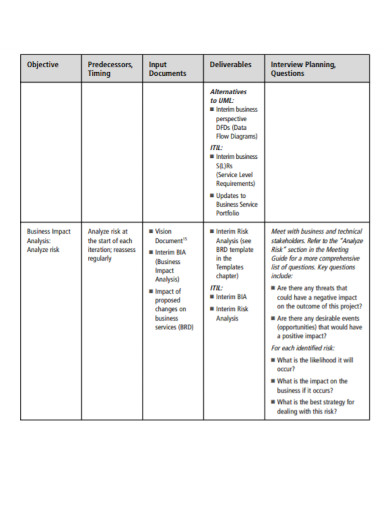
analyst.by
Details
File Format
PDF
Size: 2 MB
6. Case Study Business Analyst
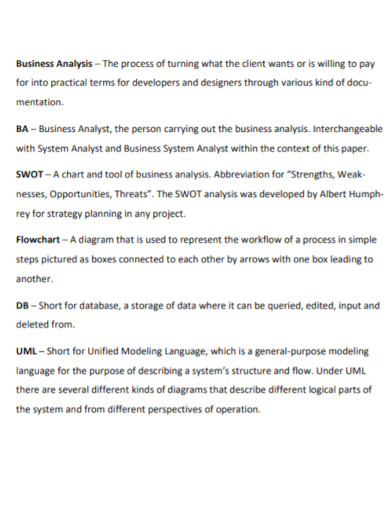
core.ac.uk
Details
File Format
PDF
Size: 1 MB
7. Technical Business Analyst
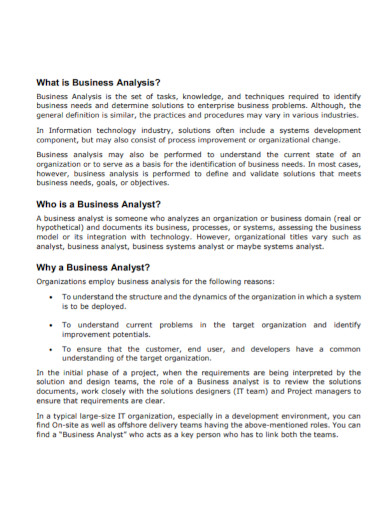
tutorialspoint.com
Details
File Format
PDF
Size: 626 KB
What is a Business Analyst?
A business analysts are responsible for guiding business for the improvement of their products and services. They use data analytics to assess and determine requirements and recommendations to the respective stakeholders and business executives.
They usually collaborate with other business owners and leaders to understand the overall process, services, products and more for value and efficiency. Depending on the responsibility of a business analyst, he or she will have the chance to work with improving the overall condition of the business.
Job Description of a Business Analyst
Business analysts create methods that support the decision in every business by working intensively with the financial aspect and establish strategies to improve the optimization of the costs.
They are responsible in creating a detailed business analysis and identifying problems and its corresponding solution.
Budgeting
Forecasting
Planning and monitoring
Business reporting
In charge of business requirements
To become an outstanding business analyst, you have to be good in solving problems and analyzing data. You also need to have a good communication skills within your clients and other workmates.
Skills of a Business Analyst
– analytical skills
– attention to every single detail
– communication skills
– organization
– problem solving skills
– teamwork
– time management
– facilitation skills
– consultative skills
– knowledge and business structure
– cost benefit analysis
Common Employers of Business Analysts
Specialist Business Analysts Firm
Consulting and Professional Service Firms
Public Sector Organizations
Technology Companies
Research Firms
Large Organizations that require In-house Analysts – this includes bank and other large companies
In some companies, the role of a business analyst is considered technical. It usually involves implementation of new systems with the benefits of the new technology. They have the option to work ‘in-house’ for a company. They can either work on their employer’s project or be an employee of a certain firm.
FAQs
Do I need experience in that field to apply for a job as a business analyst?
Some companies won’t need an experience in applying as business analyst. However, most companies would require one or two years of experience depending on the qualification they set when they are opening a job for this kind of position. What’s important is you already have the required skills to get the job done.
I am applying for the job of a business analyst, do I need to have an impressive resume?
A resume should contain information that will impress the company you have applied for. You have to put information that would convince the employer or human resource manager that you have all the reasons to be qualified for the job.
Is a business analyst’s role to manage projects from a company?
It may be part of their responsibility, but other than that their roles are broad which includes the budgeting, making decisions for business venture, etc.
The responsibility of a business analyst is never easy just like any other job positions. It requires a lot of effort and dedication to finish a task and be able to do it almost perfectly. As long as you have the skills and proper training that would let you feel you are qualified for the job, then grab the opportunity while it is still there. Look for an employer that you think would best suit you and would help you grow into a much better business analyst in the future.

